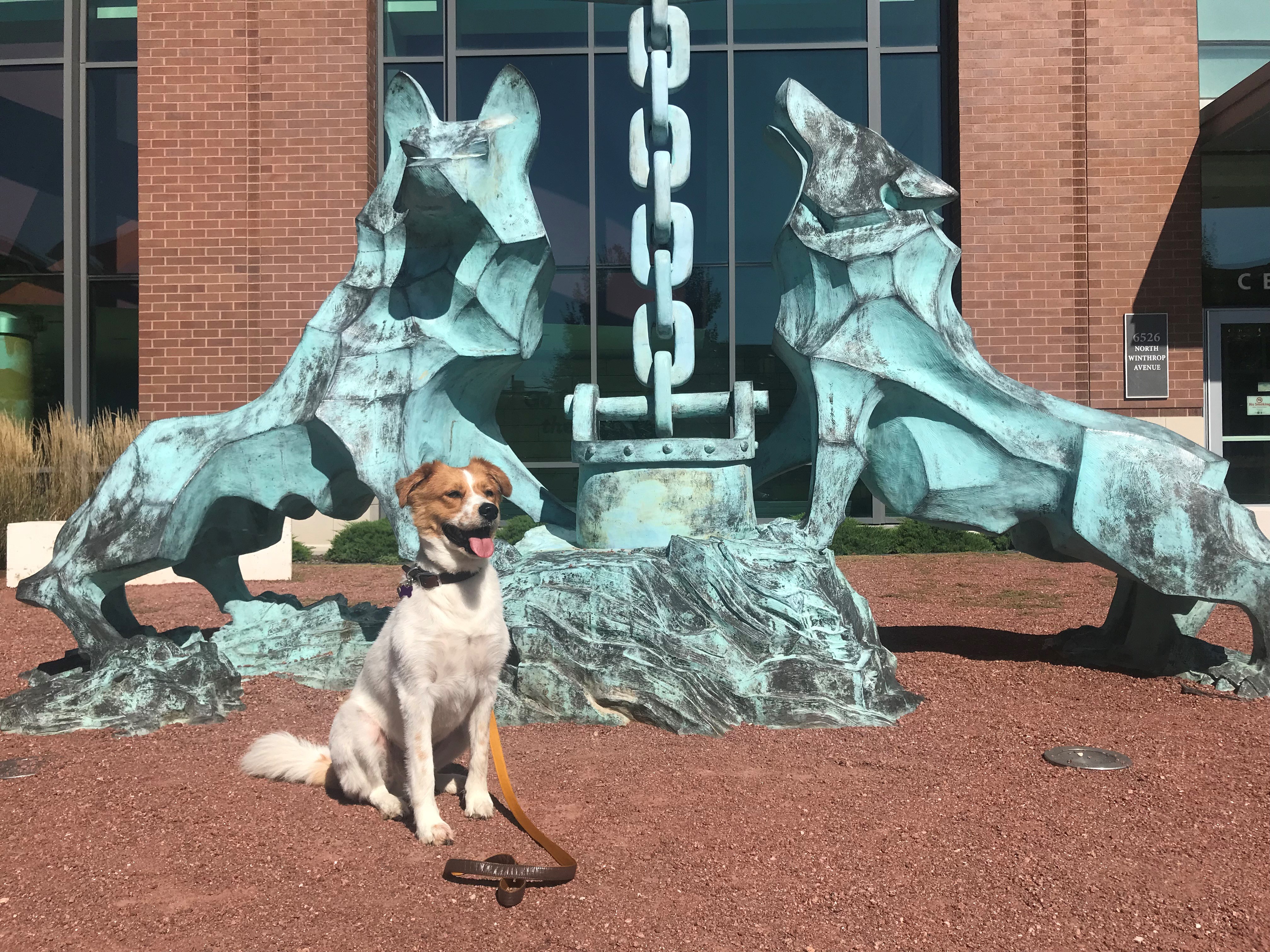Therapy Dog

Meet Ashlar!
We are happy to introduce the Loyola community to Ashlar, Loyola’s therapy dog! He is 8 years old and was adopted from the Orphans of the Storm shelter in Grayslake. He was originally being trained to be a service dog at TOPS kennel, but he is very social and was a better fit for a therapy dog role. He is a trained, certified therapy dog. Ashlar lives with the family of the Wellness Center’s Director of Counseling, but spends his days at the Wellness Center and on campus with students! He loves: belly rubs, playing fetch, and going on walks! Ashlar is so excited to work with students. Come visit him at his “Ask Ashlar” sessions if you miss your dog at home, need to destress, or just like dogs!
Ashlar mostly interacts with students during his weekly outreach and hangs out in the Wellness Center, but has limited availability and can possibly stop by Loyola events during business hours if his schedule allows. Fill out a Program request form if you are interested in possibly having Ashlar at your event. Follow Ashlar on Instagram or Facebook (ashlarthetherapydog) to see where he is on campus every week! Note: Ashlar does not live on campus, so he cannot attend events on the weekend, after 4pm on Thursdays, or after 5pm on Tuesdays, Wednesdays, or Fridays. Please note that Ashlar is not on campus on Mondays.
Ask Ashlar Schedule--Fall 2024/Spring 2025
Tuesdays | 11:15am | IC
Wednesdays | 11am | Damen
Thursdays | 1pm | IC
Fridays | 11am | Sullivan Center
Finding Your Pack at LUC
Social wellness is the ability to successfully interact with people in our world, participating in and feeling connected to your community[1]. Positive relationships are a key component of social wellness. In dealing with the isolation and virtual world of the COVID-19 pandemic, incoming college students may experience lagging social skills. Additionally, with increasing socialization taking place online, students may have difficulty forming positive relationships in person. With this is mind, Health Promotion seeks to promote positive social behaviors among incoming students.
There is vast research that reports on the benefits of pet ownership and that proximity or access to dogs is therapeutic.[2] But is there more we can learn from dogs about socialization and improving relationships?
Boundaries: If one dog pursues the other continually and ignores the other dog’s corrections (e.g., lip curls, growls or air snaps) or requests to take a break, it can turn from play into bullying. These kinds of corrections are frequently mistaken for aggression, but they are actually part of healthy, normal dog communication. Dogs should be able to correct each other when one is being inappropriate; likewise, they should be able to pay attention to another dog’s corrections.[3]
Different temperaments: While dogs are social creatures, individual dogs have different levels of tolerance for interaction with other dogs. One isn’t better than another, but it’s important to know your dog (and yourself)
The importance of non-verbals and body language: Much of how we communicate is through non-verbal means. While dogs indicate defensiveness or aggression through body posture, humans can communicate acceptance and interest via body language, as well.
Patience: It’s common for dogs to part ways after a short greeting. Camille Ward, PhD, studied greetings at a dog park (excluding the initial entries, which often involved a mob scene) amongst 52 dogs, and found that they were surprisingly brief—typically, six to eight seconds, with dogs going their separate ways after this fleeting interaction.[4] Fast friendships aren’t the norm. Sometimes it can take a long time to build your community.
To continue to find ways to Find Your Pack at LUC, follow our therapy dog's Instagram page @ashlarthetherapydog
[1] https://studentwellness.unc.edu/about-us/dimensions-wellness/social#:~:text=Social%20wellness%20is%20the%20ability,with%20family%2C%20friends%20and%20colleagues.
[2] https://www.uclahealth.org/programs/pac/about-us/animal-assisted-therapy-research
[3] https://resources.bestfriends.org/article/introducing-dogs-each-other
